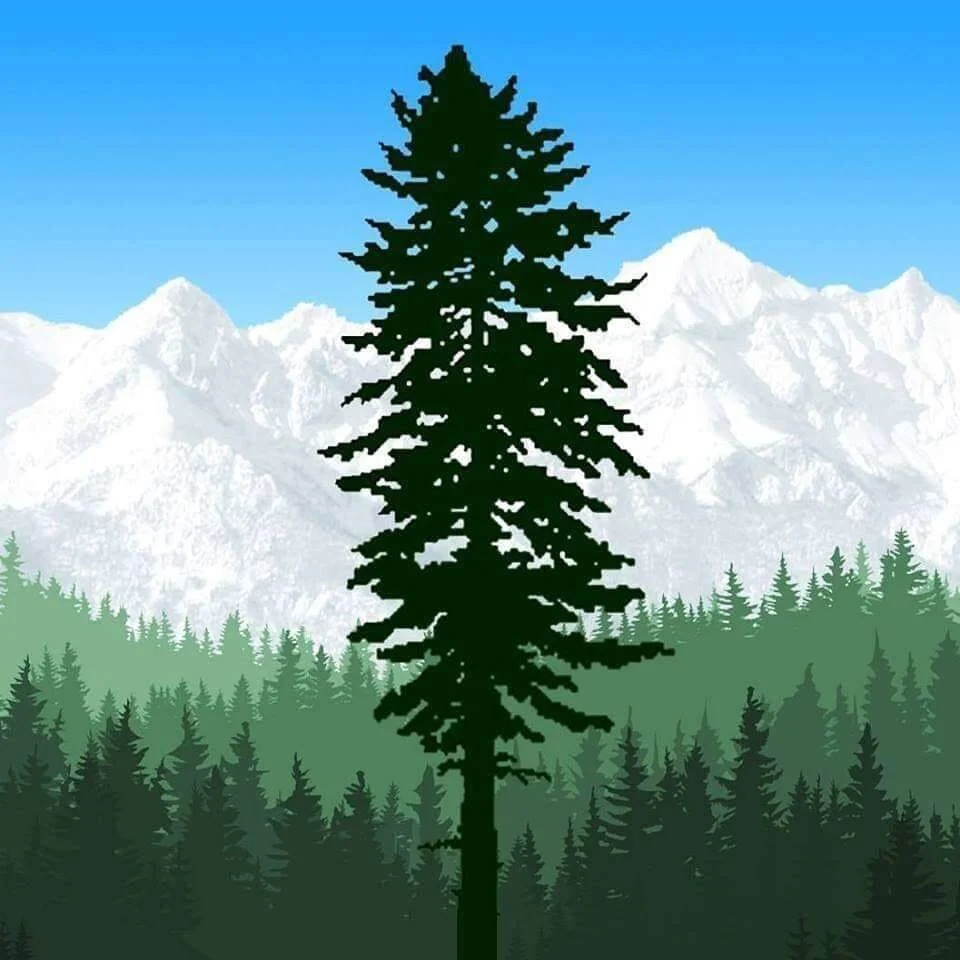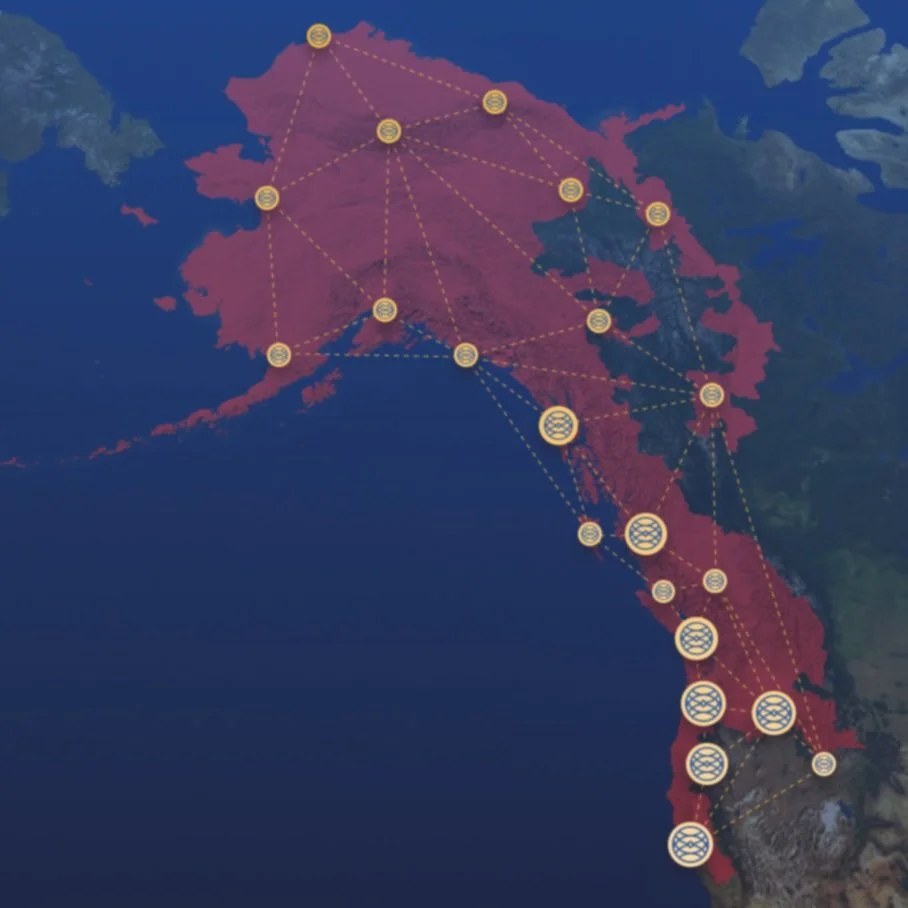We are excited to announce our next Cascadia Diplomat Training May 11 & 12 to launch this years Cascadia Culture Week.
Your Chinook Wawa Word of the Day: Snass
SNASS
[snas] or [snaws] — noun.
Meaning: Rain.
Origin: Of obscure origin, likely a manufactured onomatopoeia. Possibly Kathlamet Chinook ch’as ch’as ch’as representing the noise of rain.
A highly expressive word for rain, "snass" is said to have rhymed with the English “moss”, and is the foundation for many Chinook Wawa words and expressions regarding meteorological activity. One can inform another that it is currently raining by saying "snass chako", or say "tomollah snass" (rain tomorrow) if it is expected in the near future. A light rain shower outside is called "tenas snass", while while a drop in temperature might bring "kull snass" (ice) or even "cole snass" (snow; hail). Occasionally the word "makah" would be used for both rain and snow, though this appears to be a local variant, possibly derived from the name of the Makah First Nation which makes their home on the western tip of the Olympic Peninsula. The expression for "storm" was a little more fluid, with a rain storm being referred to as "hiyu snass" or "mesachie snass", or occasionally "tamanass makah", though wind storms would be addressed as "tamanass wind" or "mesachie wind".
First Dept of Bioregion Flag Making Workshop hosted in Laurentia
The Cascadia Department of Bioregion is proud to announce the completion of our first bioregional flag design workshop held in New York City, in the Laurentia Bioregion of North America. It included with attendees from three different North American bioregions and focused on how bioregional flags differ from national flags, and the importance of symbols that represent place.
Your Chinook Wawa Word of the Day: Mahsie
MAHSIE
[MAH-sie] — verb.
Meaning: Thanks, thank you, thankful.
Origin: French, merci 'thank you’.
Sometimes rendered as ‘masi’, ‘mausie’ and even as “masiem”, the world was adopted from French as a way of saying ‘thanks’ or ‘thank you”, or to show that one is ‘thankful’, "wawa mahsie" (to give thanks, to praise), “kloshe nesika mahsie kopa Saghalie Tyee" (let us pray to God), and "mahsie kopa Saghalie Tyee" (the Doxology). However, unlike French, the accent is placed on the first syllable when pronouncing the word in Chinook Wawa.
As in many languages, there is evidence in Chinook Wawa of calque, a process wherein the components of a word or phrase from one language is translated into another, preserving the direct meaning even if original source words become lost. This is evident in the expression “hayas mahsie” (thank you very much), an approximation of the French “grand merci”, both cases literally meaning ‘big thanks’.
The word saw the most use in northern British Columbia and the Yukon, and is still used in broadcast English in those areas.
Although Cascadia was never part of the French colonial claims in North America, and only one or two French ships ever visited the outer coast during the early fur trade era (the explorer-scientist La Perouse being the most significant), the French language was the main outside influence on the development of the jargon until the widespread influx of English-speaking Americans and British from the 1830s onwards. The cause of this was the important role played in the regional economy by the French-speaking Métis employees of the fur companies, including the Boston-owned Astoria Company. The Métis voyageurs were the main contact the companies had with their native suppliers and customers, and many keywords of the jargon were adapted from the patois spoken by these intrepid travelers and woodsmen. The French borrowings were more widespread in the more northerly reaches of the jargon's territory, and in other areas where the voyageurs played a prominent role (including the Lower Columbia fur trade forts).
Become a Cascadian Diplomat
Your Chinook Wawa Word of the Day: Skookum
Klahowya Tilikum - How to open meetings and events in Cascadia
Klahowya Tilikum - Four simple steps to open meetings and events in #Cascadia with honor and recognition to indigenous culture, history and language
First Seattle Cascadia Diplomat Training - March 23rd & 24th
Demonstrating Cascadia Decolonization - Recognizing Indigenous History
Declaration of Bioregional Emergency declared as request to plant our southern border wall denied by local Cascadian Governments
Due to the breakdown of funding talks for the planting of a border wall along the southern border, the Cascadia Department of Bioregion is forced to declare a bioregional declaration of emergency - effective immediately. Talks have stalled after Cascadian local governments have failed to fund our request for $6 billion to plant a wall of more than 30 million trees, restore streams and rivers along Cascadia's southern stretches. This tree wall is critical, and must be planted immediately, and will only take 60-500 years to mature effectively.
Cascadia Solidarity with Carrizo/Comecrudo Earth Defenders as they protest US/Mexico Border Wall
British Columbia Will Fund Next Phase of Cascadia High Speed Rail
2019 CascadiaNW Festival : Performer, Art, Music & Workshops Submissions are Open
2019 Cascadia Convergence Performer & Workshop Submissions are Open!
Cascadia Convergence has announced their submissions for workshops, presentations and performers is now open! They are looking for Cascadians who want to be involved in making the event awesome. Do you have a musical or performance act, a workshop you want to give? Just want to volunteer or take on a leadership role? Let them know!
The History of the Salish Sea: Bert Webber discusses the Salish Sea in KNKX Feature
The Cascadia Department of Bioregion is excited to share this wonderful article, audio feature and Salish Sea series created by local Seattle radio station KNKX. The Salish Sea is a defining example of bioregionalism in action, and more people need to know the power of it’s creation, and of place making.
A Growing Cascadian Identity - British Columbians Identify more with Washingtonians than their Canadian Neighbors
A newly released study shows that British Columbians feel a stronger Cascadian affinity to the south than with their eastern Canadian counterparts. In total - 54 percent of British Columbians felt they had the most in common with Washington state, 18 percent picked California while just 15 per cent chose Alberta, 9% percent chose Ontaria, and less than 3% chose Manitoba, Saskatchewan or another Canadian area.
Vol 9, No 1 of The Cascadia Subduction Zone: A Literary Quarterly has been released!
A decade into the 21st century, the world of books, the world of the arts, the world of criticism have all been caught up in violent, unpredictable change. A large part of this change has been unleashed by a continual stream of technological innovations that impact our daily lives and even our personal as well as professional relationships. Technology is changing how we read and what we read, is challenging the very forms and genres in which we write, and is making criticism and reflection more valuable and necessary than it's ever been.
























